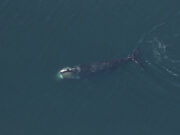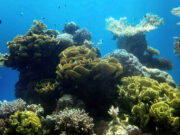Jill Studholme
Giant Lion’s Mane Jellyfish is Creature of the Month
With tentacles up to three metres long and covered with stinging cells, it's better not to get too close to the Lion's Mane jellyfish....
Stealthy cuttlefish use electric cloaking
Cuttlefish are renown for their tremendous camouflage capabilities - changing the colour and texture of their skin to match their surroundings. They have another weapon in their hide and seek armoury though - electric cloaking.
Divers kill crown-of-thorns starfish with vinegar whilst scientists unleash starfish-killing robot
Divers are killing crown-of-thorns starfish by injecting them with vinegar. Meanwhile, scientists are testing using starfish-killing robots rather than divers.
Ocean Art Underwater Photo competition now open – $75000 of prizes to be won
The Underwater Photography Guide is now accepting entries for the 5th annual Ocean Art competition. Prizes worth over $75000 are on offer in 15...
Sunscreen nanoparticles harm sealife
Materials commonly used in sunscreens are harmful to marine life. Research shows sea urchin embryos, plankton and coral all affected.
Loggerhead turtles home in on nests magnetically
Mother turtles find their way back to nesting beaches by looking for unique magnetic signatures along the coast, according to a new...
View through Australian Breaking Wave wins Underwater Photo Contest
Winner of prestigious underwater photography contest was announced today as Ray Collins, with his shot through the arc of a wave on a Gold Coast Beach. More fabulous photos feature in 12 categories. The judges awarded prizes to 60 photographers from entries from 50 countries.
Gruelling Scuba Challenge on Tomorrow
Tomorrow is the SCUBA Challenge, where disabled and able-bodied divers will complete 64 lengths in the pool - fully kitted up - and 2...
Shark loss hits global ecosystems
The loss of sharks could contribute to the destruction of one of the planet’s most under-appreciated sources of carbon storage — seagrasses, according to...
Caribbean coral reefs gone within 20 years
Most Caribbean coral reefs may disappear within 20 years, if something isn't done, a new report warns - but for once global warming is not to blame.
























